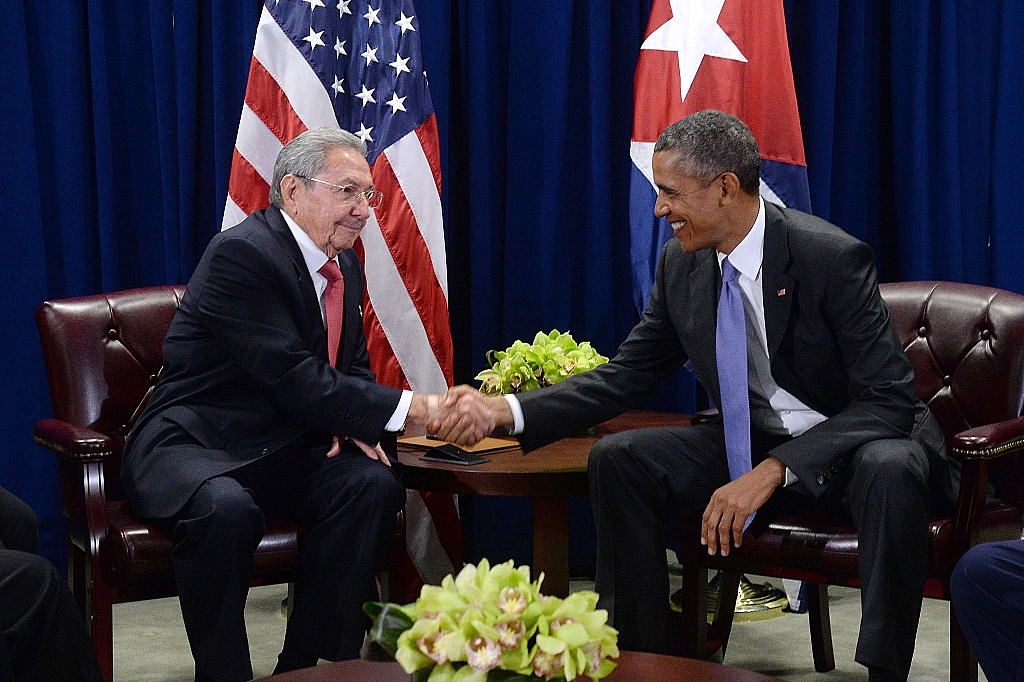World
In Cuba, Obama’s Message Of Change Is Met With Some Skepticism
- Obama hopes that the visit will help America normalize its relations with Cuba and especially reinstate economic ties.
- Obama’s visit to Cuba hasn’t just met with opposition from Republicans back home; it has also been criticized by some Cuban dissidents of the Castro regime.
- But many are hopeful that Obama’s visit to Cuba – and the subsequent opening of the Cuban economy – will trigger long-term political change.

Photo Credits- Getty Images
During the course of his visit, Obama will address Cubans from the same theater which hosted President Coolidge 88 years ago. The three-day visit will also see the President meet with entrepreneurs, dissidents and the Cuban President Raul Castro, before witnessing a baseball game between the Cuban national team and America’s Tampa Bay Rays team.
Obama hopes that the visit will help America normalize its relations with Cuba and especially reinstate economic ties, thereby helping the Cuban economy return to growth. “It’s a historic opportunity to engage directly with the Cuban people and to forge new agreements and commercial deals,” Obama said in his address to US Embassy staff in Havana. The US Embassy in Havana was reopened in August last year, after 54 years of diplomatic aloofness.
However, Obama’s ability to reinstate economic ties with Cuba is limited. America’s embargo on Cuba dates back to over half a century, and most of these sanctions require Congressional approval before they are finally lifted. But Republicans who presently dominate the US Congress have shown little appetite for lifting sanctions swiftly, given Cuba’s contentious human rights record. Last week, Senator and former Presidential candidate Marco Rubio said, “There has not been a single democratic opening; not a single change on the island in human rights. In fact, things are worse than they were before this opening.”
While Obama acknowledged that Congress is unlikely to lift sanctions during his presidency, he was hopeful that it could happen under his successor. “My strong prediction is that sometime in the next president’s administration,” he said, “whether they are a Democrat or a Republican, that the embargo in fact will be removed.”
But Obama’s visit to Cuba hasn’t just met with opposition from Republicans back home; it has also been criticized by some Cuban dissidents who believe that the President’s visit is tantamount to legitimizing Castro’s dictatorial regime. Berta Soler, leader of the dissident ‘Ladies in White’ protest group, even turned down Obama’s invitation for a meeting, arguing that Obama’s Cuban visit is misguided. “It’s not the moment,” she said. “He would be very welcome if things were getting better. But it’s not. Nothing has changed.”
On Saturday, 19 March, Cuba’s most recognizable human rights activist, Elizardo Sanchez, was detained for over three hours on arriving at Havana – marking the latest episode of skirmishes between the Castro regime and its dissidents.
Despite the skepticism, many are hopeful that Obama’s visit to Cuba – and the subsequent opening of the Cuban economy – will trigger long-term political change in the country. On Sunday, Cubans packed the streets to catch a glimpse of Obama, as he strolled through Old Havana with his family, under persistent rain. Shouts of “USA!” and “Obama!” reverberated through Havana’s stone-cobbled streets, as several cheered the President.
Some human rights observers are equally hopeful. Daniel Wilkinson, the Cuba chief of Human Rights Watch, lauded Obama for pursuing the path of engagement, contending that the sanctions regime “didn’t work and gave the Cuban government a pretext for clamping down, painting itself as a victim.” Wilkinson added, “He is also making it easier to rally international pressure on Cuba.”
Interestingly, however, America’s earliest sanctions on Cuba were brought about, not just by human rights concerns, but by political ones as well. Washington placed sanctions on Cuba at the height of the Cold War in 1960, fearing that the revolutionary regime under Fidel Castro would swing in favor of the Soviet Union.
These fears were exacerbated when Soviet missiles were found placed on the Cuban island, ready to strike at American targets, triggering a threat of impending nuclear war between the two superpowers.
Introducing ElectionsHQ + 50 Ground Reports Project
The 2024 elections might seem easy to guess, but there are some important questions that shouldn't be missed.
Do freebies still sway voters? Do people prioritise infrastructure when voting? How will Punjab vote?
The answers to these questions provide great insights into where we, as a country, are headed in the years to come.
Swarajya is starting a project with an aim to do 50 solid ground stories and a smart commentary service on WhatsApp, a one-of-a-kind. We'd love your support during this election season.
Click below to contribute.
Latest